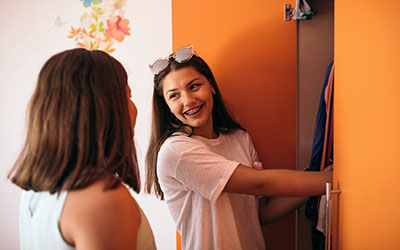Body Image and Mental Wellness
 A healthy body image — how we think and feel about our bodies — is a key part of overall mental wellness. It’s common for children of any gender to develop body-image issues as they approach puberty, and these challenges can sometimes begin even earlier.
A healthy body image — how we think and feel about our bodies — is a key part of overall mental wellness. It’s common for children of any gender to develop body-image issues as they approach puberty, and these challenges can sometimes begin even earlier.
As parents and caregivers, we can help our kids appreciate and accept their bodies. Our words and actions are powerful influences. What we say and do can encourage kids to treat their bodies with respect, make healthy choices and avoid comparing themselves to others.
There’s a helpful idea called ‘body neutrality’ that we can explore and discuss with our kids. A body-neutral mindset helps us be at peace with our body by appreciating what it does for us. There’s no reason to obsess over our body or resent it — or be a perfectionist about how it looks. The outer ‘container’ that is our body is just a small part of what makes us who we are.
We can also talk about food in a neutral way. Rather than labeling food as good or bad, we can treat it as fuel. For a body to feel good and perform its best, it needs quality food. At home, serve a variety of nourishing foods and avoid being a ‘food cop.’ (Since tweens and teens spend many hours away from home, they’re making lots of their own food choices anyway.) Don’t bug kids about eating more or eating less. Let them tune in to their bodies, feel their own hunger cues, and decide whether to eat or not. When possible, eat together so you can connect as a family. Keep meals fun and relaxed — and screen-free.
Avoid talking about weight, dieting and clothing sizes. If your child says negative things about their body, stop them gently. Help them focus on everything their body can do: run up a hill, carry a heavy load, take them where they need to go. Encourage movement and exercise because it feels good — then support your child as they discover their own favorite ways to move their body.
Limit screen time and especially social media, which tends to focus on physical appearance and can undermine self-confidence. Be sure your child is getting quality rest. Simple meditations and breathwork can also help young people feel more relaxed and centered in their bodies. And of course, be a role model: accept and care for your own body in the way it deserves!
If you worry about your child’s mental well-being as it relates to body image, eating behaviors or weight-related health issues, talk with their doctor.
Visit our Mental Health Resource Hub for more ways to support your child or teen’s mental wellness. You may also be interested in The Chat puberty classes.